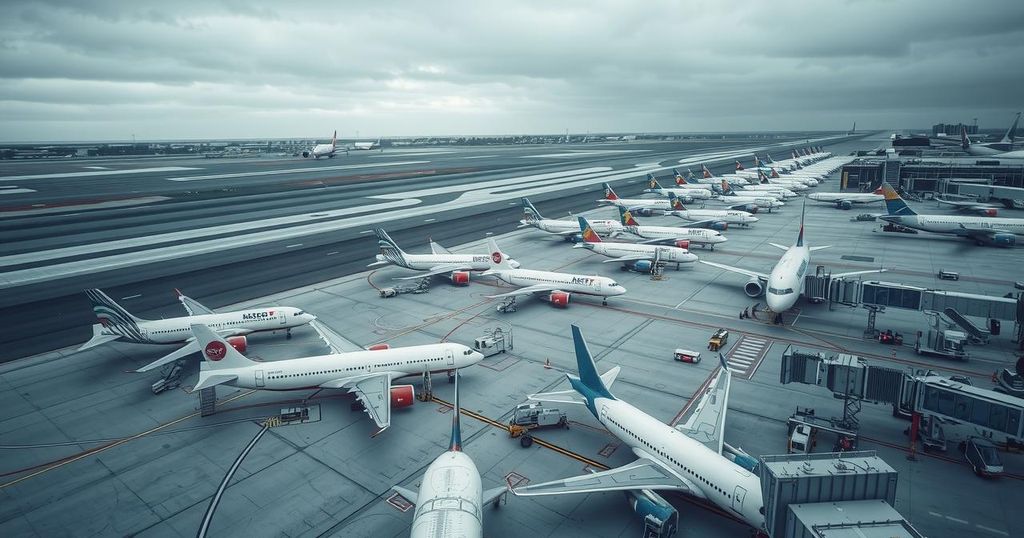Global news
ASIA, CASUALTIES, CHINA, CHINA EASTERN, DOMODEDOVO, DRONE ATTACK, EMIRATES, EUROPE, EUROPE/ASIA, KURSK, KYIV, MEXICO, MILITARY, MILITARY CLASHES, MISSILE ATTACK, MOSCOW, NORTH AMERICA, QATAR, QATAR AIRWAYS, RUSSIA, SAUDI ARABIA, SERGEI SOBYANIN, SHEREMETYEVO, U. S, UKRAINE, VNUKOVO, WAR, ZHUKOVSKY, ZHUKOVSKY AIRPORTS
Isaac Bennett
0 Comments
Impact of Ukraine’s Largest Drone Strike on Moscow: A Significant Disruption in Air Travel
Ukraine’s largest drone strike on Moscow on March 11, 2025, led to over 230 flight delays at four major airports, affecting major airlines. The event reflects Ukraine’s advancing military capabilities and significantly disrupted daily operations, illustrating the intensifying conflict between Russia and Ukraine amid heightened military activity.
On March 11, 2025, Ukraine executed the largest drone strike on Moscow, resulting in the temporary closure of Vnukovo, Domodedovo, Sheremetyevo, and Zhukovsky airports. This offensive led to over 230 flight delays, significantly disrupting major airlines such as Aeroflot, Qatar Airways, China Eastern, and Emirates as many flights were postponed or rerouted. This event underscores Ukraine’s advancing capabilities to penetrate Russian territory and marked one of the most substantial air travel disruptions since the onset of the conflict.
At the time of the drone attack, U.S. officials were scheduled to engage with a Ukrainian delegation in Saudi Arabia to explore possible resolutions for the three-year conflict. Concurrently, Russian forces were intensifying their military campaigns, particularly in the Kursk region to encircle Ukrainian troops.
Moscow Mayor Sergei Sobyanin declared this drone strike as the largest of its kind against the city, emphasizing its impact on the populated capital and its surroundings, where over 21 million residents have previously escaped the direct consequences of war until recent incidents. Tragically, two employees of Miratorg, a major meat producer in Russia, were killed due to debris from the drone, with additional injuries reported, including among children, highlighting the strike’s severe repercussions on civilian life.
Despite the strike, daily life in Moscow proceeded with commuters traveling to work; however, the four major airports paused operations before reopening shortly thereafter, leading to some flights being re-routed. The strike significantly impacted air travel, which experienced delays and a limited number of cancellations, alarming many travelers.
Ukraine has faced a relentless barrage of missile and drone assaults from Russia throughout the conflict; on the same day of the drone strike on Moscow, Kyiv reported being attacked by 126 drones and a ballistic missile. In retaliation, Ukraine has intensified its drone operations targeting Russian military infrastructure. Both nations have heavily invested in drone technology that plays a crucial role in modern warfare.
Post-strike, a senior Russian lawmaker suggested a retaliatory response with an Oreshnik hypersonic missile, previously utilized against Ukraine, indicating the ongoing escalation of military actions. President Vladimir Putin condemned the assault as a terrorist act while vowing substantial retribution.
The devastating drone strike prompted significant disruption in air travel and underscored the transformation of warfare through drone technology, suggesting that both Russia and Ukraine are bracing for escalating confrontations as they adapt their military strategies.
The drone strike on Moscow highlights Ukraine’s evolving military capabilities and the impact of modern warfare strategies, such as drone technology, on traditional conflict dynamics. The resulting disruptions to major airports illustrate the direct consequences of the ongoing conflict. As tensions rise, both Russia and Ukraine must prepare for further developments, and the international diplomatic landscape remains critical for potential resolutions.
Original Source: www.travelandtourworld.com




Post Comment